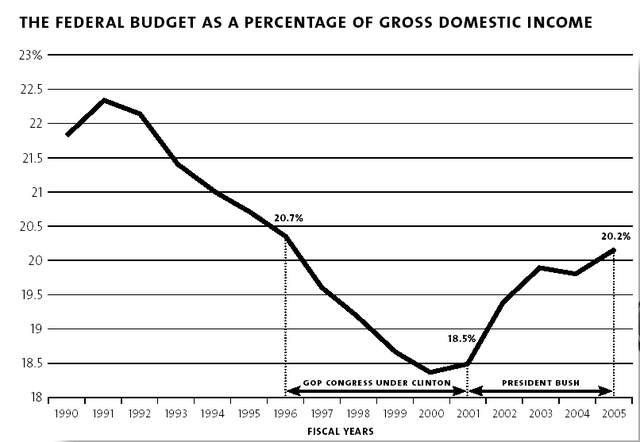Krugman on Unemployment
Via Brad deLong is Paul Krugman’s introduction to the General Theory. Point Three in Krugman’s stripped down version is:
3. Government policies to increase demand, by contrast, can reduce unemployment quickly.
Well, that would certainly explain why unemployment recovered so quickly during the Great Depression. Or perhaps, despite the fact that "all it took to get the economy going again was a surprisingly narrow, technical fix," we just weren’t trying hard enough. See also Tyler’s comments.
Libertarian Economist
Jeff Miron has a new blog. Miron is the author of Drug War Crimes: The Consequences of Prohibition, a superb economic analysis of the war on drugs (I was the editor). He is also known for his work on seasonal business cycles (see also here for Tyler’s take). The new blog, based in part on a course Jeff is teaching at Harvard has three themes.
The
first is that consequential libertarianism is consistent in its
approach to the issues. Modern liberalism and conservatism are not.The
second theme is that both liberals and conservatives advocate massive
amounts of government intervention. The two perspectives disagree about
precise policy choices, but overall they are far more similar than
different. The libertarian perspective, however, is truly distinct from
either mainstream view.The third theme is that most economic
and social problems are best addressed by eliminating the government
interventions that caused or exacerbated the problem in the first
place. Creating even more government is never a sensible approach.
Welcome to the blogosphere Jeff!
Big dog
 My admittedly uninformed perspective is that after the robot arm, progress in the field of robotics slowed greatly. Fixed location, repetitive movement robots for industrial production worked very well but the problems of autonomy turned out to be much more difficult than had been anticipated. It appears to me, however, that many roadblocks have fallen in recent years. The robots are on the move.
My admittedly uninformed perspective is that after the robot arm, progress in the field of robotics slowed greatly. Fixed location, repetitive movement robots for industrial production worked very well but the problems of autonomy turned out to be much more difficult than had been anticipated. It appears to me, however, that many roadblocks have fallen in recent years. The robots are on the move.
Case in point? Check out this movie of big dog. Further info here.
Thanks to Robin Hanson for the pointer.
Hot or Not in the AEA
Every year the AEA conducts elections to determine who will sit on the executive committee. The AEA ballot includes a short biography of the candidate and a small picture. Daniel Hamermesh looks at 312 elections between 1966 and 2004 and finds that better looking candidates are more likely to win. Most interestingly, using candidates who compete in multiple elections, Hamermesh finds that the same candidate does better with a better picture.
I have yet to be nominated for the AEA executive committee but should that happen I think I will submit this picture.
Markets in Everything: Politicians
Prosecutors call it a corruption case with no parallel in the long
history of the U.S. Congress. And it keeps getting worse. Convicted
Rep. Randall "Duke" Cunningham actually priced the illegal services he
provided.Prices came in the form of a "bribe menu" that detailed how much it
would cost contractors to essentially order multimillion-dollar
government contracts…the California Republican’s "bribery menu"… shows an escalating scale for bribes,
starting at $140,000 and a luxury yacht for a $16 million Defense
Department contract. Each additional $1 million in contract value
required a $50,000 bribe.The rate dropped to $25,000 per additional million once the contract went above $20 million.
What’s most disturbing about this is how low the prices were, $50,000 for $1 million in contract value. Now let’s remember Econ 101, what makes prices low? That’s right, competition. So who was Cunningham competing with?
GMU Law
My colleagues in GMUs school of law can be justly proud of how quickly their program has risen in the rankings. TaxProfBlog excerpts from a National Review article:
Mason vaulted from 71st place in 1995 to 41st in 2005 — an
impressive achievement given that these rankings tend to remain static
from year to year…To use a baseball metaphor, Manne was a scout who specialized in the
minor leagues. Whereas his competitors were obsessed with signing
big-name free agents in hot fields such as feminist legal theory, Manne
quietly assembled a team of undervalued unknowns. "If the market
discriminates against conservatives, then there should be good
opportunities for hiring conservatives," says Polsby. This is exactly
the sort of observation one would expect a market-savvy
law-and-economics scholar to make… "Have you read Moneyball?" asks Todd
Zywicki, another one of Mason’s bright young profs, in reference to the
best-selling book by Michael Lewis on how the Oakland Athletics
franchise assembled playoff-caliber teams on a limited budget. "We’re
the Oakland A’s of the law-school world."
Especially interesting is that GMU is probably undervalued relative to its academic achievement.
[GMU] probably would do even better but for the particular ways U.S.
News calculates worth: Forty percent of a school’s ranking is based on
reputation, as determined by judges and lawyers (15 percent) and law
professors (25 percent). "If we had Dartmouth or Princeton’s name,"
says Polsby, picking two well-regarded schools that don’t have law
programs, "we’d be a top-20 school overnight." …Brian Leiter, a professor at the University of Texas, has created
several ranking systems that rely entirely on objective criteria. It
might be said, for instance, that a school is only as good as its
students. The 75th-percentile LSAT score of Mason’s entering class in
the fall of 2005 was 166 — enough to tie it for 22nd best (with seven
other schools). It might also be said that a school is only as good as
its professors. To measure this, Leiter has created a "scholarly
impact" rating based on faculty per capita citations in scholarly
journals and books. On this scale, Mason ties for 23rd (with four other
schools). Then there’s the Social Science Research Network, which
counts the number of times faculty papers are downloaded from the
Internet; over the last twelve months, Mason professors rank
eleventh….
Who will guard the guardians?
From Cory Doctorow at Boing Boing Blog:
A CBS undercover reporting team went into 38 police stations in Miami-Dade and
Broward Counties in Florida, asking for a set of forms they could use to
complain about inappropriate police behavior. In all but three of the stations,
the police refused to give them forms. Some of the cops threatened them (on
hidden camera, no less) — one of them even touched his gun.officer: Where do you live? Where do you live? You have to tell me
where you live, what your name is, or anything like that.tester: For a complaint? I mean, like, if I have —
officer: Are you on medications?
tester: Why would you ask me something like that?
officer: Because you’re not answering any of my questions.
tester: Am I on medications?
officer: I asked you. It’s a free country. I can ask you that.
tester: Okay, you’re right.
officer: So you’re not going to tell me who you are, you’re not going to tell
me what the problem is.You’re not going to identify yourself.tester: All I asked you was, like, how do I contact —
officer: You said you have a complaint. You say my officers are acting in an
inappropriate manner.officer: So leave now. Leave now. Leave now.
HD-DVD v. Blu-Ray
The NYTimes thinks that Sony’s Blu-Ray standard for Hi Def DVD is in trouble now that Microsoft has announced it will support Toshiba’s rival standard. But the Times missed this even more important endorsement of Blu-Ray.
In defense of polygamy
I’m not convinced by Tyler’s arguments against polygamy. Let’s clear away some misconceptions.
First, it’s important to note that polygamy (specifically polygny) not monogamy is the norm in human society – some 75% of the known human societies have approved of polygny.
Second, we sometimes look around the world, note that polygny is approved of in societies such as Saudi Arabia that are not exactly women-friendly and conclude that polygny must be against the interests of women. The problem with this argument is that most societies with monogamous marriage have also not been women-friendly. Women can’t drive in polygnous Saudi Arabia but they couldn’t vote in monogamous United States until circa 1920, nor could they easily get a credit card in their own names or easily go to law school as late as the 1960s.
The basic economic argument that polygny increases the demand for women – under polygny Bill Gates can have two wives which by demonstrated preferences makes at least the second wife better off – suggests, but does not prove, that polygny can favor women. (Consider polyandry – would men complain if Angelina Jolie could have two husbands?)
Third, let’s consider Tyler’s argument that polgyny reduces investment in children. It is true that to the extent that polygny increases the number of any particular man’s children that his attention will be divided. But there are two counter effects. First, there is a selection effect. The men with more children will be the wealthier and healthier men – the better providers. If polygny increases the number of children that Bill Gates (oh what the hell my wife doesn’t always read the blog, or me!) has then average child quality over society as a whole will increase.
Moreover, if child quantity is the problem then that problem ought to be addressed directly. Does Tyler support a tax on children ala China?
Also, Tyler puts too much attention on the man. Polygny probably increases the fertility of the polygnous man but it also decreases the fertility of the polygnous woman (not by as much as it increases the fertility of the man because women are already much closer to the physical limit on children than are men but by an appreciable amount), thus the attention of mothers will increase.
Aside: Tertilt argues that polgyny decreases investment but on the basis of a model which combines polygny with many other factors such as brideprice being paid to the bride’s male relatives – this would not apply in the contemporary United States. (It also appears to me on a quick reading that the Tertilt argument may commit the Junker fallacy.)
Polygny could be very well suited to a modern society in which women work. Working women already contract out child care services – a second, stay at home wife, is not that different.
Polygny will be bad for poor men who lose out in the competition for
first wives to rich men who are on their second. This already happens,
by the way, because of serial polygamy – older men divorce their older
wives and marry younger ones leaving older women unmarried and some
younger men without young wives. Bad for the young men but not
necessarily bad for the young wives. For this reason it’s probably
true that polygny cannot be countenanced in a democracy. At least not
until the supply of young men is reduced enough so that every many can
have at least one wife even if some can have two.
On the whole, therefore, I see no strong arguments that banning polygamy (either polygny or polyandry) is socially optimal but due to the power of the patriarchy I don’t expect polygny to be approved of in the United States any time soon.
Comments are open.
A Whitman Sampler
Glen Whitman has got Coase in the brain. In Against the New
Paternalism: Internalities and the Economics of Self-Control he puts Coasian insights to good use arguing against the new paternalism of internalities.
Writing the paper must have been hard, hard work because Glen has now got the Coasian Blues. (More at the link!).
You can hire an agent to work in your basement
But you know there’s a
possible cost:
That dude could be shirkin’ yet oughta be workin’
If you
don’t hire monitors, boss!You can bring on a man to run your food
stand,
But your firm could be courtin’ a loss.
‘Cause that helpful young
man might come up with a plan
To abscond with your so-special sauce!Yeah you pick and you choose… the markets you use;
And if you
pick wrong… you’ll be singing the blues.I know that one day if my
tears go away
Then my cheeks’ll be rosy in hue
But until that day comes to
pass I must say,
I’ll be singin’ the Coasean Blues.
Make Money on eBay
Would you rather pay $10 and have free shipping or pay $5 and pay $6 for shipping? Answer: you prefer the latter. Well, at least if you are like most bidders on eBay.
Morgan and co-author Tanjim Hossain, an assistant professor at Hong
Kong University of Science and Technology, held 80 auctions of new
music CDs and Xbox video games to test how consumers respond to
different price schemes. In the eBay study, they varied the opening bid
price and shipping charges on identical CDs, ranging from Britney
Spears to Nirvana, and video games, including Halo and NBA 2K2.…A
perfectly informed and fully rational consumer will merely add together
the two parts of a price to obtain the total out-of-pocket price for an
item and then decide whether to buy and how much to bid based on this
total price.But that’s not what happened
in their eBay auctions. Instead, they found that lowering the opening
bid price while raising shipping charges attracts earlier and more
bidders and ultimately leads to higher revenues compared with doing the
reverse. Those findings suggest consumers pay less attention or even
completely overlook shipping costs when making bids…
The quote is from a writeup, the full paper is
…Plus Shipping and Handling: Revenue (Non) Equivalence in Field Experiments on eBay (subs required).
Also check out the interesting data on online pricing at Nash-equilibrium.com.
Thanks to Carl Close for the pointer.
Resale Bans in Japan
According to this post the Japanese have a very strict system of auto inspection:
The first ones to talk to the government about this were the car manufacturers,
and they convinced the government to enforce a rule that used cars have to go to
the technical inspection after 3 years, and this is a costly matter since a
check costs between 1500 and 3500 EUR. Once you’re in the system, you have to
get your car checked every 2 years, and once your car is 10 years old, you need
to go there every year. This is a reson why the Japanese change cars quite fast,
usually before the car is 3 years old. Important aspect is that you have no
control whatsoever on the cost of possible repairs, because after the technical
check, the car is driven to the garage and they do the repairs that the
technical check asked them to do, you just get the bill with your car. A very
nice rip-off… and this system is being envied by a lot of other domains, like
the electronics domain at this moment. So from April 1st 2006, ALL electronic
products sold in Japan before 2001 will be prohibited from the 2nd hand market!
Comments are open if you have more information on these interesting policies. I guarantee there is a dissertation or two here. Here is my previous post on state car "safety" programs.
Thanks to Boing Boing Blog for the link.
Addendum: An informed reader noted that the post is incorrect about electronic products being banned, major appliances will have to be inspected something like autos but the inspection doesn’t apply to computers.
Innovative Solutions for Iraq
At the event on Iraq I blogged about earlier, Ivan Eland, director of the Independent Institute’s Center on Peace & Liberty, discussed partitioning Iraq. Ivan is looking more and more prescient. (My colleague Roger Congleton has also been an early and vocal proponent of partition.) You can see Innovative Solutions for Iraq on CSPAN at the following times:
Saturday, February 25, 9:00 p.m. ET (6:00 p.m. PT) and
Monday, February 27, 6:20 a.m. ET (3:20 a.m. PT).
Monsters



Bush the Impostor
George W. Bush is widely considered one of the most conservative
presidents in history. His invasion of Iraq, his huge tax cuts, and his
intervention in the Terri Schiavo case are among the issues on which
people on the left view him as being to the right of Attila the Hun.
But those on the right have a different perspective–mostly discussed
among themselves or in forums that fly below the major media’s radar.
They know that Bush has never really been one of them the way Ronald
Reagan was. Bush is more like Richard Nixon–a man who used the right to
pursue his agenda but was never really part of it. In short, he is an
impostor…
That’s Bruce Bartlett making his case in a Cato Policy Report and don’t miss his book, Impostor. See also Stephen Slivinski’s report How Republicans became defenders of Big Government in the Milken Review.
Finally in related news, the leading contender for Bush’s Presidential library, Southern Methodist University, seized the needed land using eminent domain.
Addendum: Donald Coffin and Marty O’Brien point out that the article in the New York Sun linked above is misleading, there is a lawsuit contending that SMU is using nefarious shenanigans to get some land for the library but, since SMU is a private entity, eminent domain is not involved. Virginia Postrel has a better write-up on the situation.
